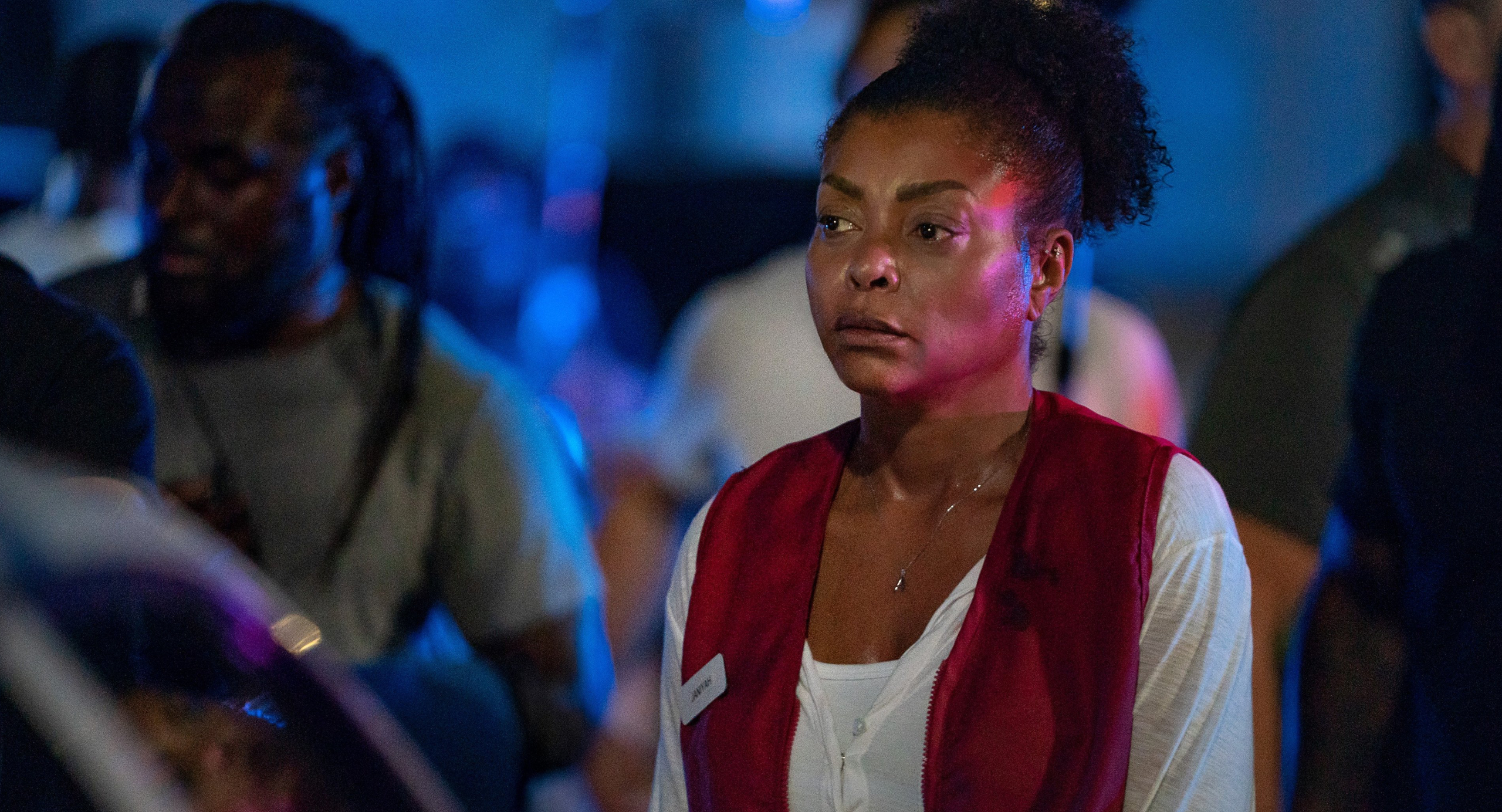Straw – Film Review
Published June 7, 2025

Tyler Perry’s latest directorial outing, Straw, is a somber, slow-burning psychological crime drama that lands somewhere between gritty realism and heightened melodrama. With Taraji P. Henson anchoring the film in a raw, heartfelt performance, Perry crafts a story that attempts to tackle the desperate choices people make when the system fails them. While the film succeeds in immersing audiences in the struggles of poverty and injustice, it’s sometimes hindered by uneven pacing and some overly familiar dramatic beats.
Straw follows Janiyah Wiltkinson (Taraji P. Henson), a single mother fighting to keep her life—and her daughter’s—intact under crushing economic and emotional pressure. From the film’s opening moments, Perry immerses viewers in Janiyah’s world: a cramped, run-down apartment, unpaid bills, a sick child needing constant care, and a job that barely pays enough to survive. This relentless depiction of poverty feels authentic and deeply felt, thanks in large part to Henson’s commanding presence. She embodies a mother’s unwavering determination, even when the world seems determined to break her.
The film does a solid job of showing the systemic failures that compound Janiyah’s struggles—uncaring landlords, inflexible employers, and social services that seem more punitive than helpful. Perry, who also wrote and produced the film, is clearly invested in shining a light on these issues, and his direction is strongest when highlighting these grim realities. The grocery store sequence, where a customer humiliates Janiyah and a boss shows no empathy, stands out as one of the film’s most affecting scenes.
The supporting cast lends the film depth, even when some characters verge on caricature. Sherri Shepherd brings a warm, empathetic presence to Nicole, the bank manager who becomes a key figure in Janiyah’s journey. Shepherd’s grounded performance provides a counterpoint to the chaos unfolding around them, and her scenes with Henson crackle with a sense of shared humanity.
Teyana Taylor, as Detective Kay Raymond, emerges as one of the film’s more compelling characters, navigating the complexities of a law enforcement system that’s all too quick to judge. Taylor’s performance is marked by a quiet intensity and a determination to see beyond the surface of Janiyah’s situation. Sinbad, in a smaller but memorable role, injects a dose of realism as Benny, a neighbor whose own hardships mirror Janiyah’s in subtle ways. Rockmond Dunbar’s Chief Wilson, meanwhile, plays the hard-nosed bureaucrat who embodies the system’s indifference.
Straw leans into a gritty, handheld aesthetic that captures the damp, oppressive atmosphere of Janiyah’s world. The rainy streets and muted color palette reflect her emotional state—a gray, unrelenting landscape where hope seems constantly out of reach. Cinematographer Justyn Moro keeps the camera close to Henson, emphasizing her isolation and desperation.
The score by Dara Taylor adds another layer of tension, with strings that build unease and underscore the emotional turbulence. At times, the music threatens to tip the film into melodrama, but Perry mostly resists the temptation to overplay his hand. The balance between realism and psychological tension is often effective, keeping the audience invested even as the story grows darker.
However, Straw isn’t without its flaws. Perry’s script sometimes overplays the trauma, with one crisis tumbling into another at a near-relentless pace. While the intention is to capture the overwhelming nature of poverty and injustice, the accumulation of hardships occasionally strains credulity, threatening to transform Janiyah’s ordeal into a checklist of every possible misfortune.
The film’s middle act, especially, suffers from pacing issues. After a taut, gripping first third, the story sags under the weight of repeated conflicts—run-ins with authorities, confrontations with her boss, a humiliating encounter at the bank—without offering enough variation in tone or rhythm. As a result, the viewer’s emotional investment is sometimes stretched thin, making it harder to fully absorb the emotional punch of Janiyah’s downward spiral.
Additionally, while Henson’s performance is consistently strong, the script occasionally leans on exposition-heavy dialogue rather than allowing her to show rather than tell. Some supporting characters—particularly the antagonists—lack the complexity to feel fully realized, with a few moments of broad villainy that undercut the film’s otherwise grounded tone.
Without venturing into spoiler territory, it’s fair to say that the film’s third act veers into territory that’s both emotionally resonant and a touch melodramatic. Perry’s decision to blend psychological drama with social commentary results in some powerful moments, but also risks diluting the impact of the film’s more grounded elements. Still, the thematic underpinnings—mental health, grief, the burdens of motherhood—remain potent and relevant.
The resolution, anchored by Henson’s performance, manages to find a note of grace amid the chaos, though some viewers may find it too neatly wrapped or emotionally manipulative. Ultimately, it’s Henson who carries the film’s emotional weight, bringing authenticity to even the most heightened sequences.
This is an ambitious film that wants to say a lot about the failures of society and the resilience of the human spirit. Tyler Perry’s script is unflinching in its depiction of systemic injustice and the impossible choices it forces on people like Janiyah. While the film’s intensity sometimes veers into excess and its pacing can be uneven, it’s anchored by a powerhouse performance from Taraji P. Henson that demands to be seen.
Straw is a well-intentioned, sometimes compelling, sometimes frustrating examination of a woman on the brink. Thanks to Henson’s raw performance and a handful of standout moments, it’s worth watching—just be prepared for a narrative that’s as heavy-handed as it is heartfelt.
